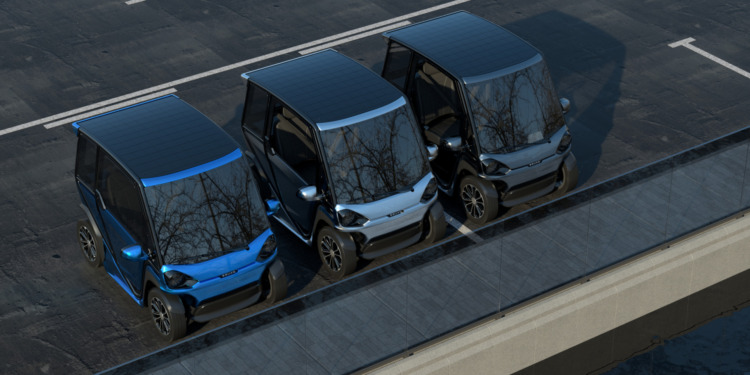Like every year, the Consumer Electronics Show (CES), the world’s biggest tech event held annually in Las Vegas, displayed the most interesting upcoming and in-development innovations in consumer tech. Between eye-catching transparent TVs and futuristic silent electric helicopters, CES 2024 also showcased a lot of green tech.
Here are our five favorite green tech products presented at CES 2024.
Ambient Photonics’ indoor solar cells
Ambient Photonics, a California-based startup, makes indoor solar cell technology that “turns any light source into power, ushering in a new age of sustainable, battery-free, connected devices.”
The technology can be used in everyday electronics. At CES 2024, Ambient Photonics “demonstrated light-powered remote controls, keyboards, computer mice, sensors, and other electronics.”
At CES, Calif-based Ambient Photonics introduced new low-light solar cells that work indoors, which cld lead to all sorts of battery-free, low-power electronics devices…
(VB) https://t.co/baG4KSZvI7— Steven Ashley (@steveashleyplus) January 9, 2024
In a press release, the startup describes its product as the “world’s most powerful low-light photovoltaic cell.”
As Ambient Photonics explains, the cells use “revolutionary new molecules and manufacturing processes to harness indoor and outdoor ambient light and create an endless power source.”
“In today’s world, connected electronics require ongoing power, which too often derives from disposable or rechargeable batteries,” Ambient Photonics’ CEO and Co-Founder Bates Marshall said. “Solar power has long been an option for certain low-power electronics like calculators or toys, but it’s taken breakthrough science from Ambient Photonics to develop high-performance solar cell technology for mass-market devices.”
Indeed, if these indoor solar cells can replace batteries, they have serious potential to be revolutionary.
Sevvy’s fast and efficient Smart Cooker
The Netherlands-based startup Sevvy‘s mainline product, the Smart Cooker, promises to massively reduce baking times using “up to 90% less electricity.” If something is supposed to be baked in the oven for half an hour, the Sevvy Smart Cooker can do it in five minutes.
Thanks to its integral heating system, Sevvy also promises maximum flavor and no wasted nutrients. This new tech also uses less fat and oil than other cooking methods.
Related Articles: The Challenges Ahead for Generative AI | Top 3 AI Productivity Tools of 2023 | 10 Tech Trends to Look for in 2024
Integral heating is a technology of Sevvy’s making, and it’s available for licensing. At this year’s CES, the Sevvy Smart Cooker received the CES 2024 “Best of Innovation” award.
Award-winning innovation alert!
Sevvy's Smart Cooker, honored at @CES 2024, is changing the game in home cooking. Cook smart, cook low, and keep those nutrients high!
#SmartCooker #InnovationAward #CES2024 https://t.co/gLN3oUfhOv
— HomeServe USA (@HomeServeUSA) January 13, 2024
“Sevvy makes it incredibly easy to create chef standard dishes with delicious textures and tastes you never imagine,” the startup’s Executir Chef Jeffrey Schoeman said. “I really love how Sevvy enhances the beautiful flavours of natural, healthy food. Better food, in less time, with more ease, means more time for delicious dinners and making new memories. To me that is what eating is all about.”
Squad Mobility: ‘World’s first solar city car’
Electric vehicles are more popular than ever, and so are hybrids. One thing you don’t see every day, however, is solar-powered vehicles. Squad Mobility, another Dutch company, is trying to change that.
The Squad is an electric car powered entirely by a solar panel on its roof. While the Squad is somewhat limited compared to larger cars, it’s surprisingly cheap, expected to retail at €6,250 in the EU and possibly the US as of 2025. It even comes with a $100 leasing option, and the company plans to create Mobility-as-a-Service and car-sharing platforms to promote flexible and pollution-free urban transportation.
The Squad’s base model does not go any faster than 45 km/hour (although there is a faster model in the works, able to go up to 70 km/hour). The Squad has a “battery range” of 100 km from a maximum of 4 swappable batteries. While this provides a relatively limited autonomy, there is an additional “solar range” available that increases as one gets closer to the equator, for example, some 20km when it’s sunny enough in the Netherlands (its country of production) and up to 31 km in Spain.
But for many with no need (or means) to buy a $25,000 EV, the Squad might be a revolution.
Infinitum’s motors: ‘Smaller, lighter, more efficient’
Infinitum is at the heart of electric engine research. The company’s most recent innovation, the Aircore EC motor, promises to decrease the weight and size of motors by 50% compared to alternatives.
Aircore motors also use less energy and cause fewer emissions. They require no iron core and use 66% less copper, a material that is notoriously dangerous to extract.
Infinitum also promises 100% circularity, meaning it will reuse all the materials that compose the engine.
The Aircore EC received two CES 2024 Innovation Awards Honoree designations — for outstanding design and engineering in both the “Sustainability” and the “Human Security for All” categories.
Zendure’s solar storage system, SuperBase V
With the popularity of house solar panels and electric cars comes an increased need for energy storage. Zendure‘s SuperBase V doesn’t come cheap, retailing at $4,499. But it promises to power your whole house, on top of your car.
To use the Superbase V, you would have to charge it yourself. The SuperBase is compatible with a large array of solar panels and can recharge 3,000 W of its total 5,100 W with solar alone. It’s also easy to transport, making it ideal for going off-grid.
6400Wh capacity, uninterruptible power supply & semi-solid state batteries. Watch our review of the powerful @Zendureofficial #SuperBaseV 6400: https://t.co/Ru7aVuEnIV pic.twitter.com/s7lVhyaGAQ
— Fenchel & Janisch (@FenchelJanisch) April 11, 2023
Zendure claims its product is the first energy storage system designed for the whole house. While this might be true, supporting your home might require two of those machines running in parallel. Add an electric vehicle to the mix, and you might have to buy additional batteries, too.
Editor’s Note: The opinions expressed here by the authors are their own, not those of Impakter.com — In the Featured Photo: The Squad, a solar-powered electric vehicle. Featured Photo Credit: Martenhamm.











